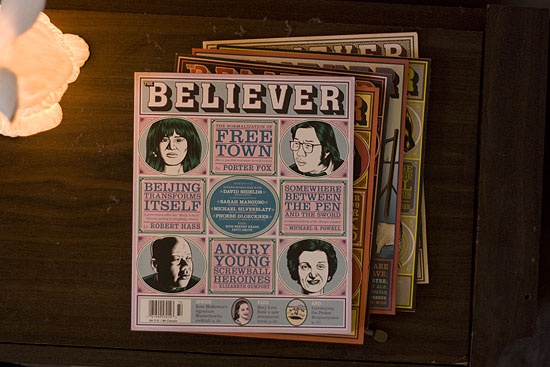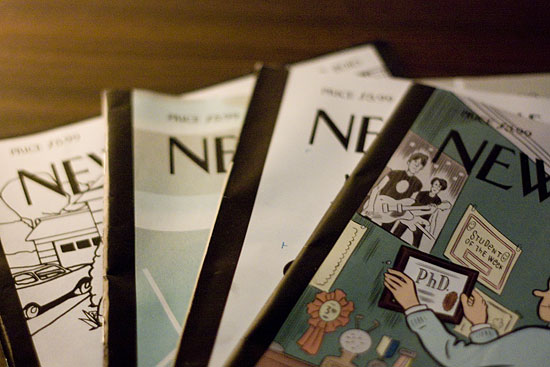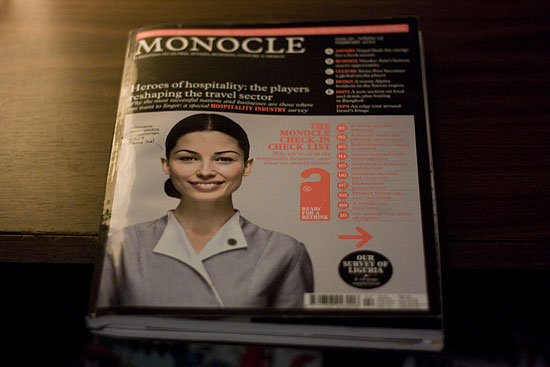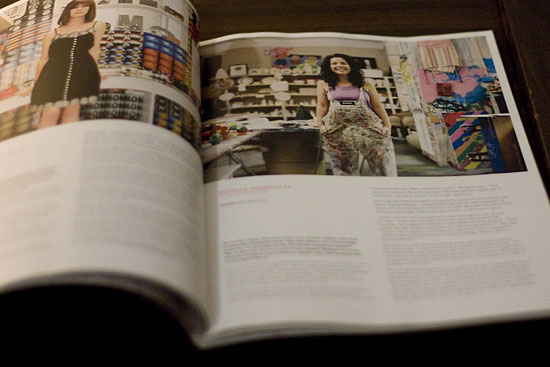Why do we buy magazines? Seriously, let’s be honest here. It’s not because we’re looking for well-written articles and great photographs or illustrations, is it? Or it’s not just that, because that stuff’s all available online. We buy magazines because we want to buy into a worldview. We want to be taken by the hand and guided by somebody who seems to know what they’re doing. “This is important,” they’ll say, pointing to something-or-other. “And this is what you should believe. And, here, this is what you should buy, and next month, don’t worry: I’ll be back for you. I’m not going anywhere.”
The best magazines manage to say the same thing over and over, issue after issue. And we know this: it’s why, whenever we pick up the latest issue of our favourite glossy, we feel as though we’re coming home to something safe and familiar. We don’t turn to magazines for information, so much as we turn to them for reassurance. Newspapers are like robots, rapidly spitting out facts and figures. Magazines are our friends.
I’ll introduce you to a few of mine.
The New Yorker
Not much needs to be said about The New Yorker that hasn’t been said already. This guy is so sure of himself he hasn’t changed substantially in eighty-five years. He’s funny, incisive, politically progressive and always tasteful, albeit never fashionable. If The New Yorker appears slightly culturally unadventurous, that’s just because he doesn’t want to do anything he’s gonna regret later. And, of course, the fact is this: everybody knows The New Yorker is the top-of-the-top. If you write, you want to write for The New Yorker. And if you draw strange black-and-white cartoons with incomprehensible punch lines, you want to draw those for The New Yorker, too. God knows, no other magazine will have ’em.

The Believer
I sometimes feel a little too stupid for The Believer, but I have a sneaking suspicion that’s the whole point. The Believer revels in being too good for you. “One day,” you think, “One day I’m going to have a genuine interest in contemporary Chinese poetry and Yugoslavian Black Wave film. One day I’m sure a several-thousand word analysis of William T. Vollmann’s 1,300-page novelistic nonfiction study of California’s desert borderlands will be right up my alley.” What’s great about The Believer, though, is that there’s no dumbing down: the assumption is that you already know almost everything there is to know about culture, so writers are free to jump into the deep end and tackle everything from Japanese ghost stories to the relationship between Leonard Woolf and B.J. Dutton in colonial Ceylon.
Monocle
Monocle is a beauty, and, like The Believer, is way out of your league. I imagine Monocle’s ideal reader looks very much like George Clooney, speaks like Barack Obama, owns precisely one house per continent, has an iPhone for voice calls, Blackberry for emails, always wears a suit, and perpetually is about to go on vacation everywhere. Monocle is the magazine for the guy who’s been everywhere, because he’s so damn important that the whole world wants him, needs him. This person, needless to say, does not exist.
Frankie
Frankie is that girl you know who’s all, like, artistic, and likes to think of herself as a bit of a tomboy, but has an inexplicable, insuppressible penchant for baking cupcakes. It’s ostensibly a women’s magazine, but the writing and visuals are so top-notch that it transcends that kind of categorisation: it’s just a damn good read.



Comments
3 responses to “Magazines Are People, Too”
Ha, spot on critique of Monocle. I bought it once because it looked interesting and well designed. Me and my friends just sat in my car for about 30 minutes trying to work out what it was about and who its target audience was.
Your right. The average reader of Monocle mustn’t exist. Must he? I think I buy it so I can be taken into a different world. I’m sure those Russian spies who got arrested will have a copy of Monocle lying around somewhere on their coffee table.
(By the way, ‘Your Day As A Freelance Writer‘ was great! And as always, spot on.
In a way, I reckon that’s what works for Monocle. The magazine is just so over-the-top and strange that it demands attention. Same with The Believer.
[…] just makes me even more sure that what makes great magazines great is a winning personality. Content isn’t […]